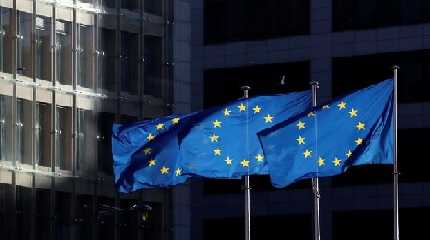
BRUSSELS, October 6. /TASS/: The European Union has adopted the eighth package of economic and individual sanctions against Moscow over the accession of four constituent entities to the Russian Federation, including the price cap on Russian oil and import bans worth 7 bln euro, the EU Council said in a statement on Thursday.
"The agreed package includes a series of biting measures intended to reinforce pressure on the Russian government and economy, weaken Russia's military capabilities," the statement said.
New restrictions are expected to be published on the EU’s Official journal later in the day, after which they will take force.
Oil price cap
The package contains the legislative basis for introducing the price cap on Russian oil, the EU Council said. "The package agreed today introduces into the EU legislation the basis to put in place a price cap related to the maritime transport of Russian oil for third countries and further restrictions on the maritime transport of crude oil and petroleum products to third countries," according to the statement.
In particular, "it will be prohibited to provide maritime transport and to provide technical assistance, brokering services or financing or financial assistance, related to the maritime transport to third countries of crude oil (as of December 2022) or petroleum products (as of February 2023) which originate in or are exported from Russia. The price cap derogation would allow the provision of the transport and these services if the oil or petroleum products are purchased at or below a pre-established price cap. The new prohibition for EU vessels to provide maritime transport for such products to third countries will apply as of the date in which the Council will unanimously decide to introduce the price cap," the EU Council said.
The price cap is expected to "drastically reduce the revenues Russia earns from oil," as well as to "serve to stabilize global energy prices," the EU believes.
Import bans worth 7 bln euro
The eighth package of sanctions against Moscow also includes import bans worth 7 bln euro, the statement said. "As concerns trade, the EU is extending the import ban on steel products that either originate in Russia or are exported from Russia. Further import restrictions are also imposed on wood pulp and paper, cigarettes, plastics and cosmetics as well as elements used in the jewelry industry such as stones and precious metals, that altogether generate significant revenues for Russia. The sale, supply transfer or export of additional goods used in the aviation sector will also be restricted," the EU Council said.
Trade sanctions will concern imports worth 7 bln euro, according to the European Commission. "Almost 7 billion euro worth of additional import restrictions have been agreed. It includes, for example, a ban on the import of Russian finished and semi-finished steel products (subject to a transition period for some semi-finished), machinery and appliances, plastics, vehicles, textiles, footwear, leather, ceramics, certain chemical products, and non-gold jewelry," the EC said.
Russians banned from having crypto-assets
The European Union has fully banned provision of crypto-asset wallet, account or custody services to Russian persons and residents in EU states. "The package agreed comprises a full ban of the provision of crypto-asset wallet, account or custody services to Russian persons and residents, regardless of the total value of those crypto-assets," according to the statement. Moreover, the provision of "architectural and engineering services as well as IT consultancy services and legal advisory services to Russia" has been prohibited.
The European Union has also banned all transactions with the Russian Maritime Register, adding it to the list of state-owned enterprises which are subject to a transaction ban.
Targeted sanctions, restrictions for facilitating circumvention, holding posts in Russian entities
The EU has announced readiness to impose targeted sanctions against persons facilitating the circumvention of restrictions against Russia. "The package agreed comprises the sanctioning of individuals and entities that have played a role in the organization of illegal "referenda", representatives of the defense sector, and well-known persons spreading disinformation about the war. The Council also decided to broaden the listing criteria on which specific designations can be based, in order to include the possibility to target those who facilitate the circumvention of EU sanctions," the statement said.
Brussels has also banned its nationals from holding "any posts on the governing bodies of certain Russian state-owned or controlled legal persons, entities or bodies."
Sanctions geography
The European Union has decided to extend its anti-Russia sanctions to the Zaporozhye and Kherson Regions, according to the statement. "The Council also decided that as of today, the geographical scope of the restrictions introduced on 23 February, including notably the import ban on goods from the non-government controlled areas of the Donetsk and Luhansk oblasts, will be extended to cover also the non-controlled areas of the oblasts of Zaporizhzhia and Kherson," the EU Council said.




